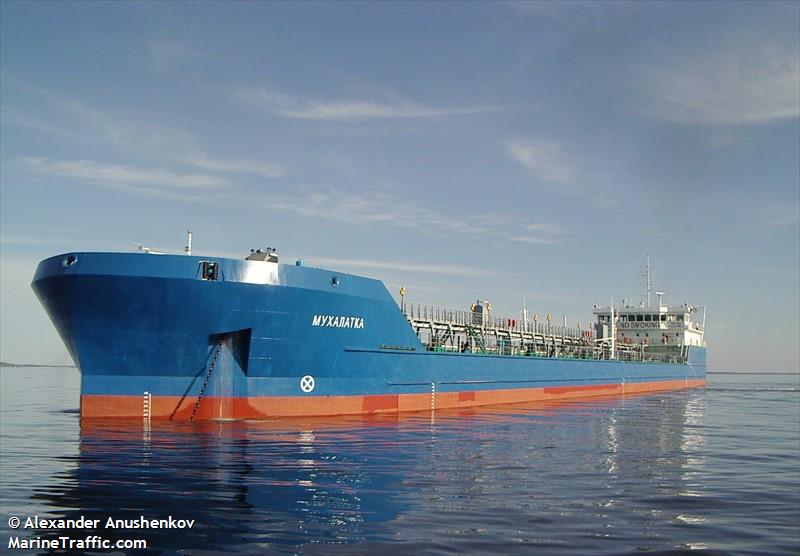Publicly available ship-tracking data confirms that at least two Russian tankers, the Yaz and Mukhalatka (pictured here), made one trip each between September and October, stopping in Greece and Limassol in Cyprus. Photo: MarineTraffic/Alexander Anushenkov
 By Guy Faulconbridge and Jonathan Saul
By Guy Faulconbridge and Jonathan Saul
LONDON, Nov 22 (Reuters) – Russian tankers have smuggled jet fuel to Syria through EU waters, bolstering military supplies to a war-torn country where Moscow is carrying out air strikes in support of the government, according to sources with knowledge of the matter.
At least two Russian-flagged ships made deliveries – which contravene EU sanctions – via Cyprus, an intelligence source with a European Union government told Reuters. There was a sharp increase in shipments in October, said the source who spoke on condition of anonymity due to the sensitivity of the matter.
A separate shipping source familiar with the movements of the Russian-flagged vessels said the ships visited Cypriot and Greek ports before delivering fuel to Syria.
The Russian defense and transport ministries did not respond to requests for comment.
A spokeswoman for EU foreign affairs and security policy said the implementation of EU restrictions lay with member states. “We trust that competent authorities are complying with their obligation to ensure respect of the restrictive measures in place and to pursue any circumvention attempts,” she added.
Greece’s foreign ministry declined to comment. The Cypriot government said its authorities had not approved the docking of any Russian tankers carrying jet fuel bound for Syria. “We would welcome any information that may be provided to us on any activity that contravenes U.N. or EU restrictive measures,” the Cypriot foreign ministry added.
Syria’s civil war, which began in 2011, has become a theater for competing global powers, with Russia and Iran supporting President Bashar al-Assad, and the United States, Gulf Arab and European powers backing rebels who want to depose him.
Russia changed the course of the conflict in favor of Assad’s government last year when it intervened with air strikes. Moscow says it targets only Islamic State militants and other jihadist fighters.
EU Council Regulation 1323/2014, introduced two years ago, bans any supply of jet fuel to Syria from the EU territories, whether or not the fuel originated in the European Union.
Over one two-week period in October, Russian tankers delivered 20,000 metric tonnes of jet fuel to Syria – worth around $9 million at today’s world prices – via the European Union, according to the EU government intelligence source.
“The jet fuel shipments from these vessels have played a vital role in maintaining Russian air strikes in the region,” said the source. “This points to a sustained Russian build-up of resources needed to support their military operation and ambitions in Syria.”
Some of the shipped fuel also went to the Syrian military, helping to “keep Assad’s air assets operational,” the source added.
The shipping source and a third person, an intelligence consultant specializing in the Mediterranean area, also said the fuel was likely intended for Russian and Syrian military use.
TRANSPONDERS OFF
Publicly available ship-tracking data confirms that at least two Russian tankers, the Yaz and Mukhalatka, made one trip each between September and October, stopping in Greece and Limassol in Cyprus. In Greece, the Yaz stopped at Agioi Theodoroi port but it is unclear where the Mukhalatka stopped.
From Cyprus, they sailed towards Syria and Lebanon. Their tracking transponders were switched off near the coasts of those countries, according to the data.
The EU intelligence source said the Mukhalatka went on to deliver jet fuel to Syria, while the other two sources said the Yaz almost certainly carried fuel to the country. All the people declined to be named due to the sensitivity of the matter.
It was unclear where the fuel might have originated.
Alexander Yaroshenko, general director of the owner of the Yaz and Mukhalatka ships, St Petersburg-based Transpetrochart, declined to comment when asked by Reuters about the shipments. Transpetrochart asked for written questions, which were supplied, but did not provide an immediate response.
Transpetrochart says on its website that it was founded in 2002 and specializes in shipping crude oil, fuel oil, diesel oil, gasoline and other oil products. It operates seven oil tankers.
The intelligence consultant said the Yaz was investigated by Greek authorities for possible EU sanctions violations during its stay in the port of Agioi Theodoroi in September, but that it was allowed to leave bound for Turkey.
The Greek coastguard service said in September that it had investigated the Yaz for possible breaches of EU regulations regarding Syria and had pressed charges against the ship’s captain. A spokesman did not give further details about the investigation when contacted by Reuters.
One coastguard official said separately the captain was charged and released pending trial.
The EU government intelligence source said Russia was also using ships flying the flags of other countries to carry jet fuel to Syria. Reuters was unable to corroborate that allegation with other sources, or with ship-tracking data. (Additional reporting by Michele Kambas and Renee Maltezou in Athens and Maria Tsvetkova in Moscow; Editing by Pravin Char)
(c) Copyright Thomson Reuters 2016.

 Join The Club
Join The Club











